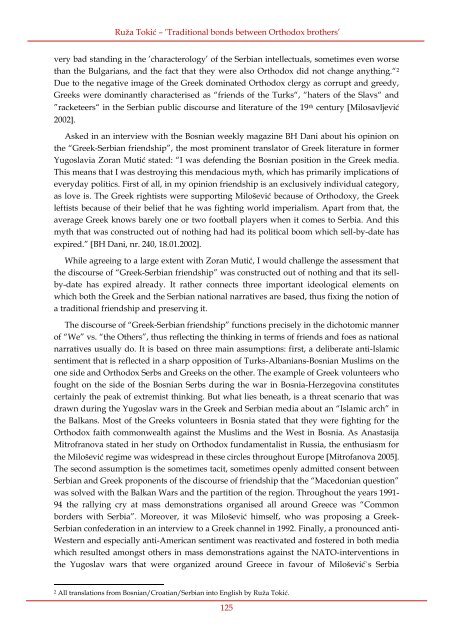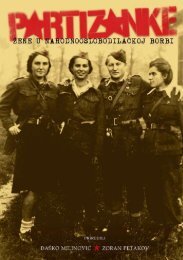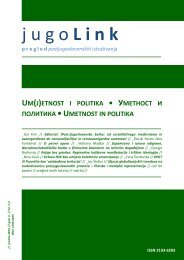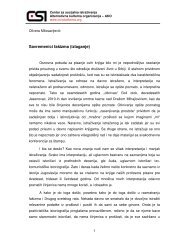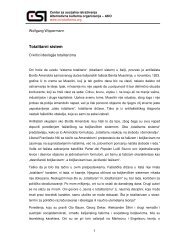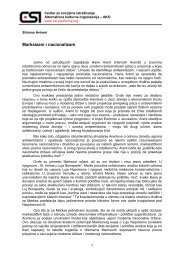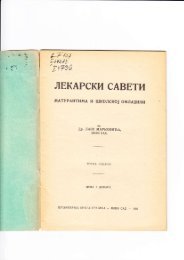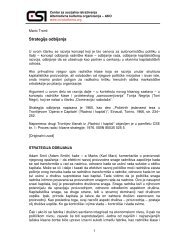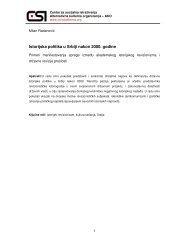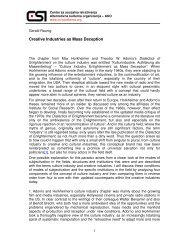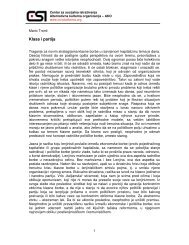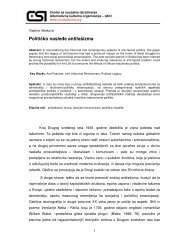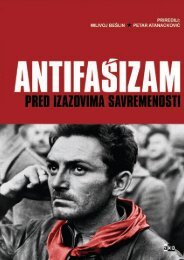S ü d o s t e u r o p ä i s c h e - Centar za socijalna istraživanja
S ü d o s t e u r o p ä i s c h e - Centar za socijalna istraživanja
S ü d o s t e u r o p ä i s c h e - Centar za socijalna istraživanja
Sie wollen auch ein ePaper? Erhöhen Sie die Reichweite Ihrer Titel.
YUMPU macht aus Druck-PDFs automatisch weboptimierte ePaper, die Google liebt.
Ruţa Tokić – ‟Traditional bonds between Orthodox brothers‟<br />
very bad standing in the ‟characterology‟ of the Serbian intellectuals, sometimes even worse<br />
than the Bulgarians, and the fact that they were also Orthodox did not change anything.“ 2<br />
Due to the negative image of the Greek dominated Orthodox clergy as corrupt and greedy,<br />
Greeks were dominantly characterised as “friends of the Turks“, “haters of the Slavs“ and<br />
”racketeers“ in the Serbian public discourse and literature of the 19 th century Milosavljević<br />
2002 .<br />
Asked in an interview with the Bosnian weekly magazine BH Dani about his opinion on<br />
the “Greek-Serbian friendship”, the most prominent translator of Greek literature in former<br />
Yugoslavia Zoran Mutić stated: “I was defending the Bosnian position in the Greek media.<br />
This means that I was destroying this mendacious myth, which has primarily implications of<br />
everyday politics. First of all, in my opinion friendship is an exclusively individual category,<br />
as love is. The Greek rightists were supporting Milošević because of Orthodoxy, the Greek<br />
leftists because of their belief that he was fighting world imperialism. Apart from that, the<br />
average Greek knows barely one or two football players when it comes to Serbia. And this<br />
myth that was constructed out of nothing had had its political boom which sell-by-date has<br />
expired.” BH Dani, nr. 240, 18.01.2002 .<br />
While agreeing to a large extent with Zoran Mutić, I would challenge the assessment that<br />
the discourse of “Greek-Serbian friendship” was constructed out of nothing and that its sellby-date<br />
has expired already. It rather connects three important ideological elements on<br />
which both the Greek and the Serbian national narratives are based, thus fixing the notion of<br />
a traditional friendship and preserving it.<br />
The discourse of “Greek-Serbian friendship” functions precisely in the dichotomic manner<br />
of “We” vs. “the Others”, thus reflecting the thinking in terms of friends and foes as national<br />
narratives usually do. It is based on three main assumptions: first, a deliberate anti-Islamic<br />
sentiment that is reflected in a sharp opposition of Turks-Albanians-Bosnian Muslims on the<br />
one side and Orthodox Serbs and Greeks on the other. The example of Greek volunteers who<br />
fought on the side of the Bosnian Serbs during the war in Bosnia-Herzegovina constitutes<br />
certainly the peak of extremist thinking. But what lies beneath, is a threat scenario that was<br />
drawn during the Yugoslav wars in the Greek and Serbian media about an “Islamic arch” in<br />
the Balkans. Most of the Greeks volunteers in Bosnia stated that they were fighting for the<br />
Orthodox faith commonwealth against the Muslims and the West in Bosnia. As Anastasija<br />
Mitrofranova stated in her study on Orthodox fundamentalist in Russia, the enthusiasm for<br />
the Milošević regime was widespread in these circles throughout Europe Mitrofanova 2005 .<br />
The second assumption is the sometimes tacit, sometimes openly admitted consent between<br />
Serbian and Greek proponents of the discourse of friendship that the “Macedonian question”<br />
was solved with the Balkan Wars and the partition of the region. Throughout the years 1991-<br />
94 the rallying cry at mass demonstrations organised all around Greece was “Common<br />
borders with Serbia”. Moreover, it was Milošević himself, who was proposing a Greek-<br />
Serbian confederation in an interview to a Greek channel in 1992. Finally, a pronounced anti-<br />
Western and especially anti-American sentiment was reactivated and fostered in both media<br />
which resulted amongst others in mass demonstrations against the NATO-interventions in<br />
the Yugoslav wars that were organized around Greece in favour of Milošević`s Serbia<br />
2 All translations from Bosnian/Croatian/Serbian into English by Ruţa Tokić.<br />
125


